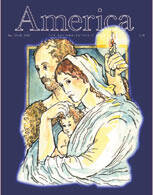In a sermon preached at Oxford around 1825, when he was still an Anglican, John Henry Newman began by saying that in every part of Scripture it is told us again and again, that to make sinful creatures holy was the great end which our Lord had in view in taking upon Him our nature, and thus none but the holy will be accepted for His sake at the last day. Though it closes on a somber note of warning, this is an exhilarating sentence because it is so encouraging. Most Americans would assure a Gallup pollster that they believe it is far more important to be good than to be handsome or rich or famous. All too often, however, behavior is not conformed to belief.
Left to ourselves, we find that our good resolves are flickering. But as Newman said in that sermon, we are really not left to ourselves: God works in and through us. Christmas is immeasurably joyful because it announces that the Word of God was made flesh and the Child was born in Bethlehem that we might be made holy.
All the same, a troubling question arises. Looking around the world on this Christmas 2000, people of faith might wonder why that great end is not more speedily, or at least more visibly attained, why the human family and its institutions have not by now become better than they are. After all, as early as the second century, Tertullian was telling his pagan neighbors in North Africa that Christians were copossessors with them of this world, but not of its errors: compossessores mundi, non erroris. Christians, in other words, are not to flee the world, but to transform it.
For a few weeks in December there are indeed some reminders in urban centers that the first Advent was followed by the first Christmas. Angels with gilded trumpets share department store windows with Santa Claus. A few blocks from the America offices in mid-Manhattan, the Radio City Music Hall’s Christmas show includes a Nativity pageant with live camels that are benignly applauded when they sway across the stage.
During most of the year, however, so far as we can tell, there is little evidence in the chambers of government and the stock markets, in the shops and theaters and teeming streets of American and European cities that the Incarnation ever took place.
But we are cranky and stumbling creatures with strictly limited vision. We have no direct knowledge of the divine causality and cannot see how that divine action is working in human hearts. We do have some sense of creation’s immense stretches of time and space. The astrophysicists tell us the universe is billions of years old. The paleontologists tell us there were tiny beetles living in the oceans 500 million years ago. The archeologists report that creatures identifiably human were gathering shells along the shores of African lakes 250,000 years ago and that the first migrants from East Africa reached Europe 50,000 years ago.
For all we know, the radiation of the Incarnation may yet take eons to complete, and the human story may yet stretch into the unimaginable future. But Christians believe that in every chapter of that story the grace of Christ will be shaping cosmic history and drawing all human persons toward what the Advent liturgy calls endless day.
Yet the Christian also knows, like everyone else, that in every life, even the sunniest, there will be some hard times. Indeed, in many lives hardness is almost all there is. Over the millennia, the face of humanity has by and large been a tear-stained, blood-stained face, and even nowadays hecatombs have been all too common. Kosovo’s civil war killed thousands and left another 800,000 homeless. Rwanda, Somalia and Sudan were turned into regions of darkness lit up by the flames of hideous cruelties.
Beyond these tidal waves of misery, there is an undercurrent of sadness that touches even uneventful lives. Not that fatalism should have the last word. God’s plan for the world, said the Second Vatican Council in its Decree on the Apostolate of the Laity, is that people should work together to restore the temporal sphere of things and to develop it unceasingly (No. 7).
But the restoration goes slowly and often seems stalled. No wonder, then, if victims of great suffering find a blasphemy springing almost involuntarily to their lips: Does God really care for us and our tears?
Christmas is the answer. Christmas scatters that blasphemy as light scatters darkness. The God who created the stars and fashioned the mountains and filled the seas so loved the world that he gave his only son, that whoever believes in him might not perish but might have eternal life (Jn. 3:16).
Physicists may see the world as following the second law of thermodynamicsconfusion increases and order decreases. In 14th-century England, Julian of Norwich, an anchoress and mystic, saw it quite differently. In her Revelations of Divine Love she reported words worth recalling at Christmas time or any time: See, I am God: see, I am in all things: see, I do all things: see, I never lift my hands off my works, nor ever shall.... All shall be well and all manner of thing shall be well.








